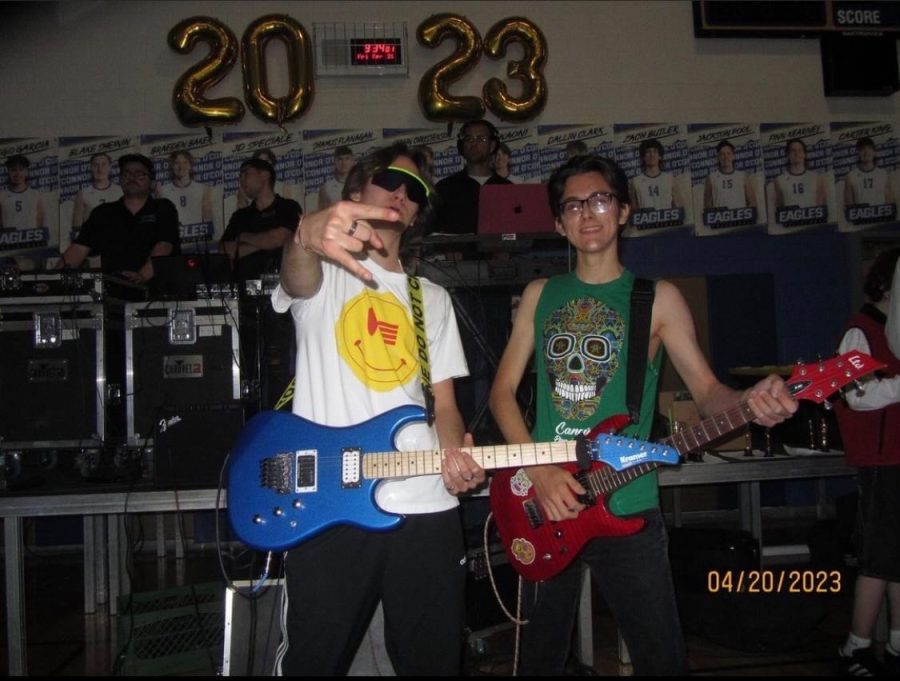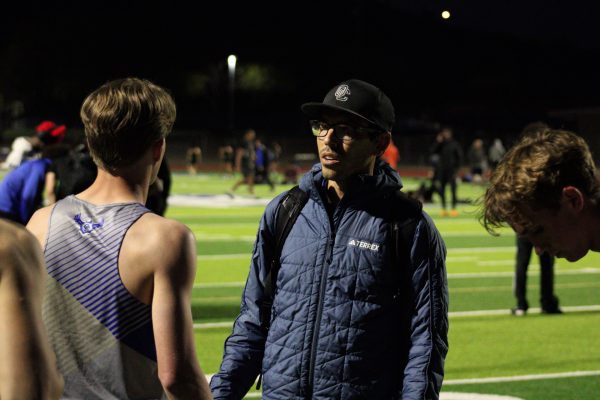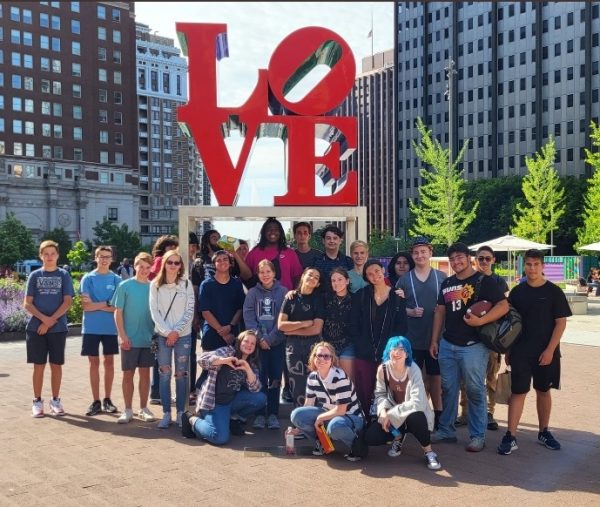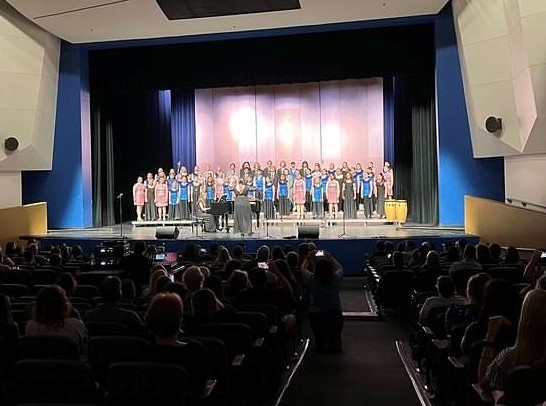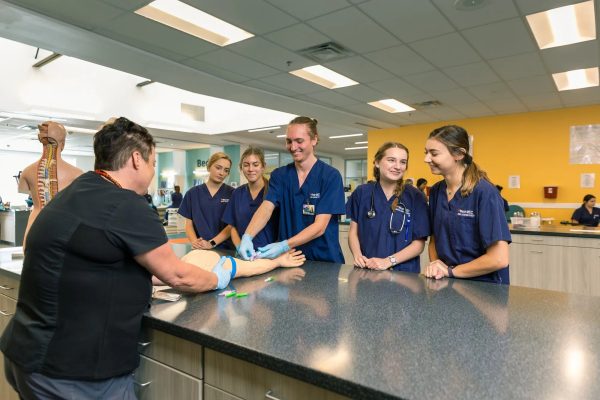Smells like OHS spirit; revival of student bands
Photo courtesy of Jaya Amoako-Agyei
Band members Brandon Loomis (left), junior, and Phoenix Wilcox (right), junior, perform the national anthem at the assembly.
May 16, 2023
The desire to experience music is the sole constant in the ever-changing nature of young people. The music scene has taken different forms throughout the decades: folk of the 60’s, hard rock and disco of the 70’s, punk and new wave of the 80’s, and grunge and R&B of the 90’s. In 2023, student artists are emerging again.
COVID-19 put a pause to live shows, but not the ability to create. Now that venues from house shows, to the Nile Theater, and even State Farm Stadium are beginning to open back up, a revival in music can be witnessed. The resurgence does not only apply to audience members. Teenage players are harkening back to sounds of the past while developing new music of their own.
“Being younger and making music makes it more prominent, especially to people that are older because they’re like, oh this is really cool that these guys are making music that I like at the age that I liked that music,” said Brandon Loomis, junior.
What sets the current generation apart is the utilization of technology. Streaming services such as Spotify and Apple Music empower students to release original music anywhere.
“The whole music scene has changed so much. It’s insane that music recording and production is so accessible, more than it ever has been before because like at my house, with just a laptop, a little interface, and keyboard you can create anything,” said Kenna Kelly, senior.
Musical collaborations are still prevalent, but the idea of a supergroup is more archaic. Artists can fluctuate between working solo or merging with others. When bands are conceived, variations of style are unified through chemistry.
“Most people would probably think it’s just skill. But it’s a lot more than that because someone could be really skillful but just not work well in a team. It’s already pretty hard to find the skill you want and then it’s a little bit harder to find that teamwork,” Loomis said.
An advantage of being young while constructing a song is the ability to not confine oneself to a single genre. Categories of music that are thought to juxtapose each other can be experimented with. Jazz influences may be incorporated into a metal song, evolving into a subgenre of progressive melodies.
“Guitarists I admire incorporate a lot of detail and passion into the music part and not just focusing on lyrics. All of those guitar players are very expressive, they kind of sing with their guitars… One of my things now is every day I try and find one or two new musicians and get that into my system to get more ideas, more flexibility, more styles,” said Vyncent Van Atta, sophomore.
Students at OHS can take opportunities offered in the arts department to learn about the technique that goes into producing music. Understanding pitch, rhythm, and dynamics establishes a foundation and adds depth to songs.
“Taking the song structure that is used in Broadway influences the song structure of the music I like to make because normal like pop music song structure is verse, chorus, verse, chorus, but in theater songs have more freedom of structure,” Kelly said.
Moving beyond the initial creative process, one of the most vital aspects of music is experiencing it in the flesh.
“I think live music is how music was started for everyone. You didn’t have recordings. That’s the foundation of everything,” Kelly said.
Entire communities are built on a sense of love and appreciation for art. Adolescents can begin to foster a sense of identity.
“Whenever you go to a smaller show, you could really talk to anyone and the conversation will click because they already have so many similar interests to you,” Loomis said.
Music can be immensely personal to the listener. During a confusing period of life, a great deal of teenagers covet the possibility of being seen and understood.
“Someone’s song could mean something different to everyone there, but they share the experience of interpreting the songs differently together and I think that’s pretty awesome about live music,” Kelly said.
Numerous people attend shows to simply have a good time. Smaller venues give players the skills to connect with the crowd, but it takes practice.
“It’s just interactive. It’s not really that much on the crowd because the crowds are there to have fun. It’s more on the artists that are on stage and the showmanship of the people who are on stage to interact with the crowd and make sure everybody feels included in the show. Not just like they’re watching you perform, they want to be in on the performance,” Van Atta said.
Comparable to any endeavor, there are inevitable obstacles that come with taking action, especially when one is still in high school. Logistically, there are factors that are not in the person’s control.
“Some challenges though, are you don’t have the freedom that you want in everyday life… You can’t go out to venues all night and obviously you’re not the one completely funding it. So you just kind of have to be aware of that,” Van Atta said.
A certain level of networking can resolve potential or arising issues. Previously formed relationships provide a secure position in the scene.
“You get to kind of know people in the scene and then they’re your resources going forward. You have a guy who has a space here, then he has connections somewhere else and you just kind of build a little web of people who you know,” Van Atta said.
While many plan to continue music in the future, they maintain an unpretentious outlook. Enjoyment takes precedent.
“I don’t want to be the cliché of, ‘I want to be a famous rock star.’ That’s not what I’m trying to do, this is mainly for fun. I definitely want to try to do this as long as I can. If it goes anywhere, that’s cool and all. But if it doesn’t, you don’t have to freak out,” Loomis said.
At its core, music is a manifestation of observing the human condition. Its profundity can be felt regardless of age.
“Music is such an interesting art of translating your own feelings into sound and then that can be distributed into other people’s brains. That is so insane, I think that’s what I love about it. The way it can convey feelings and life, it just spreads to everything. I don’t need to worry about the future of music because there’s always sounds,” Kelly said.



